Статьи журнала - Arctic and North
Все статьи: 972
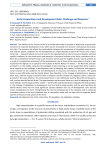
Arctic Corporations and Development Risks: Challenge and Response
Статья научная
The realities of the Russian Arctic in recent decades make it possible to determine a special phenomenon of corporate development risks, which can be structured into resource, institutional and ecosystem risks. The resource risk reflects the contradiction between the conjuncture of the global resource markets and the specific conditions for the development of unique deposits located in the Arctic zone; institutional risk — between federal norms and rules for the development of natural resource deposits and local specific conditions for the construction and operation of resource facilities in the Arctic; ecosystem risk reflects the contradiction between large-scale economic activity and the fragility of Arctic natural systems. As a result of a comparative assessment of the development risks of three Arctic corporations in Russia, it was found that the highest risk is typical for the facilities of Norilsk Nickel, the lowest — for NovaTEK, and Gazpromneft is in the middle. Using the OLI paradigm of John Dunning, it can be argued that Arctic corporations respond to the challenge of development risks by adapting their spatial, institutional and organizational structure to the conditions for the development of resources and resource territories. The spatial factor is most efficiently used by Norilsk Nickel, then NovaTEK, in the strategy of adaptation to development risks, with the receipt of benefits from localization and the creation of a regional cluster, while Gazpromneft is the least effective. The institutional factor is most effectively used by NovaTEK and Gazpromneft, and the least by Norilsk Nickel. The organizational and structural factor as a tool for adapting to risks is most skillfully used by Gazpromneft, weaker — by NovaTEK and Norilsk Nickel. Integrally, the best positions in the strategy of adaptation to development risks are held by Gazpromneft, and the worst positions by Norilsk Nickel, which has the most significant contrast between the size of development risks and the means of adaptation to them. Strengthening the internal competencies of the company and its corporate innovation system is the most important way to successfully cope with the high risks of corporate development of resources and spaces of the Arctic.
Бесплатно
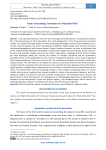
Arctic Forecasting: Formation of a Research Field
Статья научная
In the domestic literature, there are still not enough works devoted to a comprehensive description of the phenomenon of Arctic forecasting. This article distinguishes it from the general socio-economic context. The analysis of foreign studies on Arctic forecasting technologies and key factors allowed us to reveal the research question: can Arctic forecasting be considered a highly specific area? The work has examined physical-geographical and resource factors: climate, maritime transport, ice cover, oil production and others. Studies demonstrating the interrelation of factors were widely used: for example, climate and energy, social and economic changes. Based on the authors’ approaches, a typology of Arctic forecast models has been developed, taking into account the number of variables considered and the quantitativequalitative nature of the specifications. In the course of analyzing the dynamics of the research agenda of the European symposium “The Future of the Arctic”, the evolutionary formation of the topic of Arctic forecasting is shown. The main feature is its reliance on resources as the basic essence of the Arctic economy. It is shown that the involvement of Arctic resources in the economic turnover depends on the world technological dynamics: through natural resources the Arctic economy is connected with the world economic processes. The phenomenon of Arctic forecasting includes a more merged, multitasking nature of naturalclimatic and economic modelling than standard models for studies of environmental dynamics, with forecasting of positive and adverse social and economic consequences. The presented results structure the phenomenon of Arctic forecasting for the development of methodological approaches to substantiate the prospects for the development of polar and northern regions. The considered factors will be useful in developing state policy measures in relation to the Arctic zone of the Russian Federation.
Бесплатно
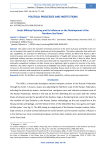
Arctic Military Posturing and Its Influence on the Development of the Northern Sea Route
Статья научная
The author traces the evolution of military presence in the Arctic by Russia and NATO in the article. He analyses the impact of military posturing on Arctic geopolitics. The author advocates that while military capabilities are essential for deterrence, unnecessary military rhetoric by NATO and Russia is detrimental to peace and security in the Arctic. Arctic geopolitics is fraught with tensions due to regular highly publicized military exercises and posturing in the area. The new Arctic Cold War is likely to affect Russia more adversely due to Western sanctions post-2014 and the requirement to develop the NSR as an internationally competitive transport corridor. Russia has a legitimate right to protect its security in the Arctic. However, the author argues it is unnecessary to highlight such events regularly, and it may be more useful to focus on the economy and rationalize military spending. Russia needs to focus on its relationship with the Nordic countries and reemphasize its peaceful and cooperative engagement in the Arctic. Its leadership of the Arctic Council is crucial to reducing tensions in the Arctic.
Бесплатно
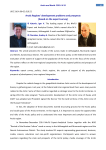
Arctic Regions’ development problems and prospects (based on the expert survey)
Статья научная
The article presents the results of the survey made in Arkhangelsk, Murmansk region and Nenets Autonomous District. The assessment of the Arctic policy at the federal level and the evaluation of the system of support of the population of the Arctic are in the focus of the article. The authors reflect on the inter-‐regional cooperation, the Arctic regional policies and prospects of the region.
Бесплатно
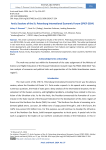
Arctic Sessions of the St. Petersburg International Economic Forum (SPIEF-2024)
Статья научная
The article summarizes the general results of the 27th St. Petersburg International Economic Forum (SPIEF-2024, Forum), which took place in St. Petersburg from 5 to 8 June 2024. The author participated in two main Arctic sessions, which were devoted to the Northern Sea Route and international aspects of Arctic development, and interacted with practitioners from federal and regional ministries and transport companies. This article is devoted to analysing these sessions.
Бесплатно
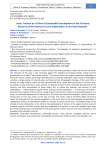
Статья научная
In recent decades, interest in Arctic tourism has been growing at a high rate all over the world. The relevance of this area is also increasing against the background of global climate change and the development of so-called “last chance tourism”. The Russian Arctic has unique competitive advantages in the Arctic tourism market, preserving vulnerable Arctic and tundra landscapes under various anthropogenic activities, a large number of national parks and historical and ethnographic heritage. At the same time, a number of single-industry towns are also concentrated there, which have practically no revenue base. According to many researchers, Arctic tourism can become a driver for the sustainable development of the territory and local communities of these towns. But to realize this scenario, the interest of local stakeholders — representatives of government, business and the population — is necessary. This article is devoted to the analysis of the results of a study of local communities’ interest in tourism development as a driver of sustainable development of the territory. The Arctic zone of the Komi Republic, namely the former mining town of Inta, was chosen as the area of study. The results of desk and field studies carried out within the framework of the research expedition in the Arctic zone of the Komi Republic are described. A comparative analysis of international studies on the topic has been carried out, a conceptual model of the attitude of local communities in the Arctic to the development of tourism in the region and the results of in-depth research and focus groups with key stakeholders of tourism in the Komi Republic have been described, limiting factors and potential for the development of Arctic tourism have been identified on the example of the selected territories.
Бесплатно
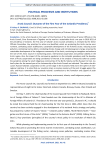
Arctic council: outcome of the first year of the icelandic presidency
Статья научная
In the article based on the report of the Chairman of the Committee of Senior Officials in the Arctic Council, Einar Gunnarsson «Together on the road to a sustainable Arctic: one year in 2019-2021 of the presidency of Iceland», the first year of Iceland’s Arctic Council presidency is reviewed by the Senior Officials Committee. Key priorities for action are identified, which are protecting the Arctic marine environment, combating ocean acidification; sustainable development of the fisheries sector; reducing ocean pollution; combating marine debris; combating climate change and introducing green energy; ensuring the sustainable development of the indigenous community of the Arctic; continuing to strengthen and enhance the role of the Arctic Council in maintaining peace, international cooperation and political stability in the Arctic region. Also, the impact of the coronavirus pandemic on the Icelandic presidency and the development of Arctic cooperation are being considered. Of interest is the analysis of measures taken to counter the pandemic among the small indigenous communities of the North, Siberia and the Russian Far East. Iceland’s plans for the second year of its chairmanship of the Arctic Council are indicated. The author also discusses Russian-Icelandic cooperation at the current stage in the economic field and in the sphere of interregional relations. It is noted that our countries share a common memory of the joint struggle against fascism, and Russia remembers with gratitude Iceland’s contribution to the formation and support of polar convoys.
Бесплатно
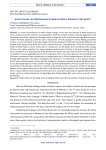
Arctic frontier: Ice Silk Road and its role in China's advance to the Arctic
Статья научная
In recent circumstances of world climate change, Arctic zone has become of great interest for those countries actively involved in its development. With the constant climate warming, deglaciation and increasing of sea-level, commercial transport ways through the Arctic Ocean become a possible economic solution for large exporting countries. Due to importance of north passage for China, Beijing proclaimed itself as a "near-circle State" to get advantages from the development of Northern Sea Route (NSR) that can provide direct access to the Arctic zone and its natural resources. Considering this, China has recently published its White Paper on Arctic Policy, where it announces "Ice Silk Road" to be the official Arctic strategy of China. This article underlines the major intentions and interests of China in its Arctic strategy. One of China's intentions is an enhancement of the Northern Sea Route, that still raises concerns from the specialists whether it can be applicable part of Arctic strategy of China. This article approves that according to Ice Silk Road's connotation Russia should play an indispensable role in China's advancement to the Arctic zone through NSR. Moreover, the author investigates the influence of "Ice Silk Road" on Sino-Russian relations. Both China and Russia appear to prioritize this strategy to ameliorate economic situation and infrastructure in less-developed regions of two countries. Though, economic development of Arctic coastal cities is one of the priorities of the Russian Federation, it remains to be attentive to the involvement of China in the development of the region, mainly out of fear that it will influence its legal position in the Arctic region. Meanwhile, it stays important that two governments come to a consensus concerning the legislative basis of NSR usage and have a deep assessment of advantages and disadvantages that come out as a result of their partnership.
Бесплатно
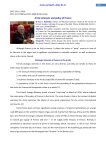
Arctic interests and policy of France
Статья научная
The author considers scientific, economic and political activities of France for the development and exploration of the Arctic, providing security there. Along with some other non-Arctic countries, France is not ready to accept such a situation when eight members of the Arctic Council solve Arctic problems on behalf of all mankind.
Бесплатно
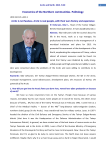
Arctic is not faceless. Arctic is real people, with their own history and experience
Статья научная
Ildar Dzhuraev told the Journal about his life in the Arctic, work as a top manager, his professional achievements in the management of a municipal institution and plans for 2015. He presented his assessment of the development of the North, emphasizing the uniqueness of Taimyr, where almost all mineral resources could be found. He noted that Taimyr was inhabited by really strongwilled people with high potential and ability to work, who were concerned about the problems of the Arctic and were willing to contribute to its development.
Бесплатно
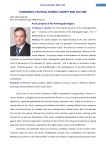
Arctic projects of the Arkhangelsk Region
Статья научная
The article analyzes the implementation of the state order for military defense products and the potential of Severodvinsk shipyards and shipbuilding innovative cluster. The area has a number of successfully implemented projects in the region and development industry for diamond deposits. The project aimed at development of lead-zinc deposit “Pavlovsk” on the Novaya Zemlya is done. Arkhangelsk region becomes a leader in the development of bioenergy on the principles of “green economy”, and it operates an innovative timber cluster “PomorInnovaLes”. The real breakthrough is the establishment of the RAS Federal Research Center for the complex study of the Arctic in Arkhangelsk. In general, our region is not just the area occupied with generating new ideas and projects, but also preserving cultural and historical traditions.
Бесплатно
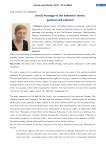
Arctic strategy of the subarctic states: general and especial
Статья научная
There are considering in comparison the arctic strategies of the main arctic states: Russia, USA, Canada, Norway, Denmark. The author stresses the high level of Russian arctic strategy working out and the soft power using in the north strategy of Norway.
Бесплатно
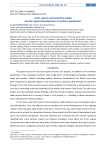
Arctic subsea communication cables and the regional development of northern peripheries
Статья научная
Some years ago, the Arctic Ocean was still described as one of the last oceans that did not have subsea communications cables across it. This situation is now changing. One of the greatest increases in global data transfer is predicted to be traffic between Asia and Europe, and the Arctic Ocean offers a shortcut, making physical cable connections shorter and decreasing latency. Recent developments regarding two ongoing subsea communications cable projects (Quintillion and Arctic Connect), which aim to connect East Asia and Europe, are discussed, and the connection between these projects and regional development policies in Hokkaido and northern Finland are analysed. It is shown that the proposition that improved international connectivity through subsea communications cables could bring information-intensive industries into the region had been stronger in Finland. This is largely due to a lack of information and awareness concerning these projects among the regional actors in Hokkaido; however, no concrete policy or funding instrument has been developed in either of the case regions.
Бесплатно
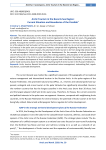
Arctic tourism in the Barents Sea region: current situation and boundaries of the possible
Статья научная
The modern features and peculiarities of the organization of the Arctic tourism in the Russian Federation are considered. Over the past ten years, the geography of recreational nature management and international tourism in the Russian Arctic has significantly expanded. Among the northern countries, Russia has the longest coastline in the Arctic seas and the largest sector of the adjacent shelf and waters of the seas of the Arctic Ocean. So its economic and political interests in the polar zone are obvious. However, compared with neighboring Arctic countries, in the Russian Federation for several reasons the potential of Arctic tourism is far from being fully utilized, and its further development is regulated by natural and anthropogenic factors. On the example of the actively developing Arctic cruise tourism in the Barents Sea region, the existing problems and prospects of the possible development of tourism in the Arctic in modern conditions are discussed. Based on the studies characterizing the modern development of Arctic tourism in general and in the Barents Sea basin in particular, the author made generalizing conclusions, which list the factors limiting the development of Arctic tourism in the Russian Federation.
Бесплатно
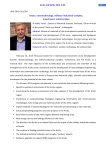
Arctic: nanotechnology, military-industrial complex, Investment, national idea
Статья научная
Review of materials of the international investment summit on investment and development of the nano, engineering and biological, information and communication technologies, fuel and energy and raw material base of the Arctic region, the Arctic as a Russian national idea.
Бесплатно
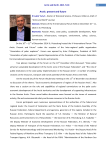
Статья научная
Review of the IV International Forum held on December 10—11, 2014 in St. Petersburg.
Бесплатно
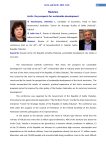
Arctic: the prospects for sustainable development
Статья
Review of the international scientific conference held on the 26th—29th of November2014 in Yakutsk, Sakha Republic (Yakutia)
Бесплатно
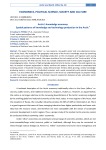
Arctic’s knowledge economy: Spatial patterns of knowledge and technology production in the Arctic
Статья научная
This paper focuses on ‘other,’ i.e. non-resource, non-public sector and non-subsistence economies of the Arctic. We investigate the geography and assets of the Arctic’s knowledge sector by examining both supply and output side of the knowledge production at the circumpolar and regional scales (using Alaska as a case study). In other words, this paper provides a first-cut analysis of the “Arctic variety” of the knowledge economy. We find that the Arctic has variable endowment with human capital engaged in new knowledge generation. Clusters of high knowledge potential tend to locate in larger cities and regional capitals. An analysis of patent registration in Alaska, confirms this pattern, but also reveals a complicated and evolving picture of localized innovation. Alaska demonstrates limited, albeit growing, variety knowledge-producing sectors, a strong role of individual inventors and a weak connectivity with outside knowledge clusters. It is also evident that knowledge production in the Arctic has underdeveloped circumpolar linkages, and thus requires urgent efforts to stimulate research cooperation between private and public sector inventors in the Arctic jurisdictions.
Бесплатно
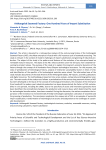
Arkhangelsk Seaweed Factory: One Hundred Years of Import Substitution
Статья научная
The article is devoted to a retrospective analysis of the century-long history of the Arkhangelsk Seaweed Factory (ASF), the oldest enterprise in Russia with a full resource cycle of seaweed processing. The study is relevant in the context of modern challenges of import substitution and greening of industrial production. The subject of the study is the patterns and features of the evolution of an enterprise based on renewable natural resources. The object is the ASF, whose activities cover the full cycle, from seaweed harvesting to product release. The purpose of the study is to explain the long-term economic dynamics of the factory through the concept of of Kondratiev-Perez-Glazyev technological structures. For this purpose, the tasks of periodization of technological history, analysis of enterprise sustainability factors in times of crisis and identification of the specifics of its technological evolution were solved. The information base of the study includes documents of the State Archive of the Arkhangelsk Oblast, ASF reports, scientific publications and digital resources. The methodology is based on time series analysis, comparative and biographical analysis. The main results of the study are as follows: a periodization of the century-long economic history of ASF has been developed on the basis of the concept of technological formations; the evolution of the enterprise from handicraft to modern post-industrial production has been demonstrated; the factors of ASF sustainability in crisis periods, including the 1990s, due to the specificity of assets and innovative approaches have been identified; the contradictions between the production and resource base, which determined the need for technological transformation, have been revealed. During the discussion, the authors emphasize the importance of the transition to environmentally friendly technologies (plantation cultivation of seaweed) and the greening of production. The conclusions emphasize the unique role of ASF as an example of successful import substitution, transformation of technological structures and adaptation to the challenges of sustainable development.
Бесплатно
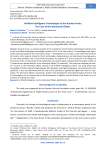
Artificial Intelligence Technologies in the Russian Arctic: The Case of the Murmansk Oblast
Статья научная
Russian Arctic is a positive example of the introduction of information technologies (Industry 4.0.) as well as artificial intelligence technologies (Industry 5.0.). In the 21st century, IT-technologies have significantly improved quality of life in the Russian Arctic — development of IT camps, access to the Internet from the tundra. Arctic projects related to the AI technologies implementation are becoming increasingly popular: the article provides a list of such Arctic AI projects. An analysis of IT and AI vacancies in all subjects of the Russian Arctic on the website of the headhunter recruitment agency showed that the largest number of IT vacancies was posted directly in the Murmansk Oblast (74 vacancies). The study also analyzed job seekers’ resumes in the Murmansk Oblast, posted in the Artificial Intelligence section. The study shows that knowledge of Python programming language, SQL databases and English language is a prerequisite for all AI specialists. It was also determined that the salary of AI specialists is significantly higher than that of IT specialists. The Murmansk Oblast is becoming a leader in the development and implementation of both IT and AI technologies; this is primarily due to the development of logistics and the Northern Sea Route as an alternative to existing sea routes.
Бесплатно

